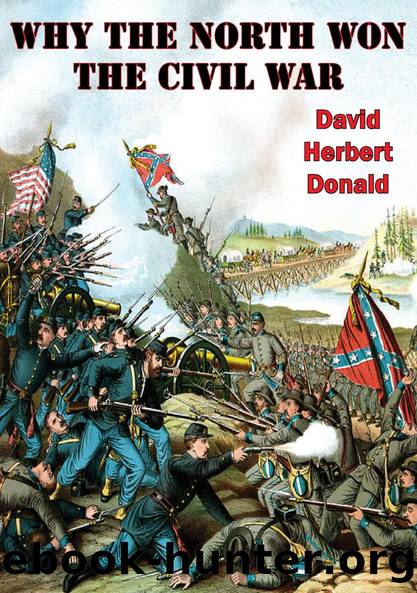Why The North Won The Civil War by David Herbert Donald

Author:David Herbert Donald [Donald, David Herbert]
Language: eng
Format: epub
Tags: History, United States, Civil War Period (1850-1877), Military, Modern, 19th Century
ISBN: 9781786251985
Google: O7NvCwAAQBAJ
Publisher: Pickle Partners Publishing
Published: 2015-11-06T02:58:16+00:00
Died of Democracy â by David Donald
HISTORIANS HAVE EXPLAINED Confederate defeat in a variety of ways, but even as they blame the Southâs weaker economic resources, declining morale, defective strategy, and feeble political leadership, they have a faintly apologetic air. They know that, had the Confederacy gained its independence, they would be writing, with equal cogency, to explain the Southern victory. The historian, in other words, is a camp follower of the successful army.
As the historian explains why the winning side triumphed, he naturally tends to identify the victor with the most cherished values of the society in which he lives. He may describe the defeated cause as courteous, chivalrous, and romantic (maternal virtues which we admire but do not respect), but he attributes to the victor the masculine traits of strength, power, aggressiveness, and tough mindedness (paternal assets which we may not like but necessarily respect). In American society there are three such values to which historians give adherence: All are convinced that it is a desirable and necessary thing to preserve the American Union; all believe that Negro slavery is an evil; and all profess a faith in democratic government.
It is not the truth of these beliefs but their juxtaposition which causes the great confusion about the Civil War. Historians, recognizing that Lincolnâs government was fighting for the preservation of the Union and for the freedom of the slaves, attribute to it also the third great positive value, the defense of democracy. Such a view is a distortion of the facts. If we could free ourselves of the notion that democracy (a âgoodâ thing) must inevitably have been connected with the winning (hence âgoodâ) Lincoln government, we would discover abundant evidence that the Confederacy, not the Union, represented the democratic forces in American life.{1}
The democratic tendencies of the Confederacy were all too plainly reflected in its army. Accustomed to regarding themselves as the equals of any men in the world, the Southerners never took kindly to regimented life. Even their appearance showed that they considered themselves individualistic citizens who were temporarily assisting their country. One astonished Englishman, after seeing his first Confederate soldiers, gasped: âAnything less like the received notion, at home, of how a soldier should look...never met my eye.â
Like all American soldiers in all wars, the Confederate disliked military discipline. Mississippi volunteers shirked assignments which they found tedious, declaring âthey did not enlist to do guard duty but to fight the Yankies.â At the outbreak of the war, when wealthier soldiers received onerous orders, some coolly instructed their Negro servants to carry them out, meanwhile uncomplainingly taking âupon themselves the duty of sitting on the fence and superintending the work.â Others hired substitutes to perform their chores. âThe two or three men of the overseer class who were to be found in nearly every company,â George Cary Eggleston recalled, âturned some nimble quarters by standing other menâs turns of guard-duty at twenty-five cents an hour.â
The Southern soldier reserved his democratic right to interpret his orders broadly. The British observer, Colonel J.
Download
This site does not store any files on its server. We only index and link to content provided by other sites. Please contact the content providers to delete copyright contents if any and email us, we'll remove relevant links or contents immediately.
| United States | Abolition |
| Campaigns & Battlefields | Confederacy |
| Naval Operations | Regimental Histories |
| Women |
In Cold Blood by Truman Capote(3374)
The Innovators: How a Group of Hackers, Geniuses, and Geeks Created the Digital Revolution by Walter Isaacson(3150)
Steve Jobs by Walter Isaacson(2889)
All the President's Men by Carl Bernstein & Bob Woodward(2364)
Lonely Planet New York City by Lonely Planet(2217)
And the Band Played On by Randy Shilts(2197)
The Room Where It Happened by John Bolton;(2150)
The Poisoner's Handbook by Deborah Blum(2135)
The Innovators by Walter Isaacson(2098)
The Murder of Marilyn Monroe by Jay Margolis(2095)
Lincoln by David Herbert Donald(1982)
A Colony in a Nation by Chris Hayes(1927)
Being George Washington by Beck Glenn(1916)
Under the Banner of Heaven: A Story of Violent Faith by Jon Krakauer(1788)
Amelia Earhart by Doris L. Rich(1689)
The Unsettlers by Mark Sundeen(1682)
Dirt by Bill Buford(1670)
Birdmen by Lawrence Goldstone(1662)
Zeitoun by Dave Eggers(1643)
